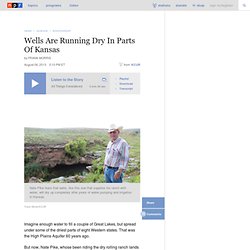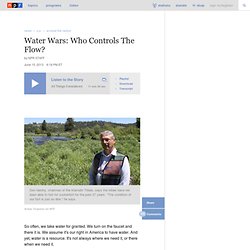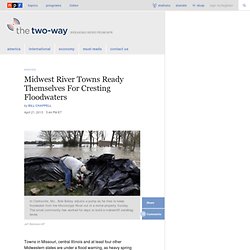

Wells Are Running Dry In Parts Of Kansas. Hide captionNate Pike fears that wells, like this one that supplies his ranch with water, will dry up completely after years of water pumping and irrigation in Kansas.

Frank Morris/KCUR Nate Pike fears that wells, like this one that supplies his ranch with water, will dry up completely after years of water pumping and irrigation in Kansas. Imagine enough water to fill a couple of Great Lakes, but spread under some of the driest parts of eight Western states. That was the High Plains Aquifer 60 years ago. But now, Nate Pike, whose been riding the dry rolling ranch lands south of Dodge City, Kan., for most of his 80 years, can't even go fishing at his favorite spring called St. "And that thing had a lot of water in it. Pike blames it on new pumping and irrigation systems.
An irrigation well near Copeland, Kan., run by Jesse Garetson, pumps 1,000 gallons per minute, 24 hours a day, seven days a week. That calibrated deluge has sprouted a vibrant economy on this arid land. Life Without Water is Awkward : Change the Course (Part 2) June 2013 Who Controls The Flow? Hide captionDon Gentry, chairman of the Klamath Tribes, says the tribes have not been able to fish for suckerfish for the past 27 years.

"The condition of our fish is just so dire," he says. Amelia Templeton for NPR Don Gentry, chairman of the Klamath Tribes, says the tribes have not been able to fish for suckerfish for the past 27 years. "The condition of our fish is just so dire," he says. So often, we take water for granted. Rivers don't follow political boundaries — they flow through states and over international borders. So what are our legal rights when it comes to water? There are two doctrines that govern surface water rights in the U.S. — one for the West and one for the East. 'A Reasonable Right' The riparian doctrine covers the East.
The Western U.S. uses the prior appropriation doctrine. People wanted a claim to water but often lived too far away from a river for the riparian doctrine to make any sense. Midwest River Towns Ready Themselves For Cresting Floodwaters : The Two-Way. Hide captionIn Clarksville, Mo., Bob Bailey adjusts a pump as he tries to keep floodwater from the Mississippi River out of a rental property Sunday.

The small community has worked for days to build a makeshift sandbag levee. Jeff Roberson/AP In Clarksville, Mo., Bob Bailey adjusts a pump as he tries to keep floodwater from the Mississippi River out of a rental property Sunday. The small community has worked for days to build a makeshift sandbag levee. Towns in Missouri, central Illinois and at least four other Midwestern states are under a flood warning, as heavy spring rains swell the Mississippi and other rivers to dangerously high crests. In places where residents have been forced to evacuate their homes, the American Red Cross has set up shelters at schools and other facilities. From St. Missouri Department of Transportation officials told KMOV their main concern was that the barges might severely damage the bridges. Rising Use of Corn Ethanol Stresses Midwestern Aquifers.
WATER WOES: Rising corn ethanol production is beginning to draw down underground water supplies in the Midwest.Image: Flickr/Rastoney Biofuel production is often touted as a boon to rural development, but a University of Iowa engineering professor is worried about the effect of corn ethanol plants on his and other states' water supplies. At a biofuels energy symposium hosted by the Institute of Medicine of the National Academies last week in Washington, D.C., professor Jerald Schnoor said corn ethanol production facilities require large quantities of high-purity water during the fermentation process.
This water is obtained from underground aquifers, and as ethanol production reaches a fever pitch in Iowa, the state's water supply is threatened. Even in 2009, Iowa state geologists warned that the Jordan aquifer was being pumped at an unsustainable rate in several counties, exceeding the state's 1975 base line within the next two decades. But in Russell, home to a plant owned by U.S.